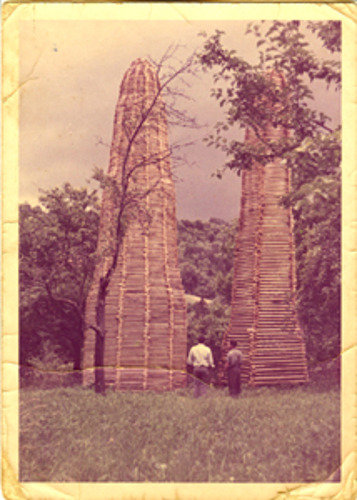Hannah Brackston
Catherine Grau
Zoe Kreye
Polonca Lovsin
Ralo Mayer
RESANITA
Kamen Stoyanov
Margarethe Makovec
Anton Lederer
14/3/2014
Measures of Saving the World
Rotor, Graz
The fifth and concluding part of the exhibition series. In the frame of the series are traced alternatives to the presently dominant ways of "cultivating" our planet for a period of more than one year in total and presented artistic production in this context.

Artists:
Hannah Brackston, Catherine Grau / Zoe Kreye, Polonca Lovšin, Ralo Mayer, RESANITA, Kamen Stoyanov
Curated by:
Margarethe Makovec & Anton Lederer
“It is an irony of fate that just in our time, which might be called the final stage of Enlightenment and the Industrial Age, humankind cannot think and act wisely anymore despite its knowledge. Modern humans do not know nature anymore. They also do not know themselves.” This is what the Indonesian writer and visual artist Arahmaiani writes in her text Thoughts of a Dreaming Nomad. To set something against this missing wisdom is one of the motivations in the fifth and concluding part of the exhibition series. In the frame of the series we traced alternatives to the presently dominant ways of “cultivating“ our planet for a period of more than one year in total and presented artistic production in this context.
Measures of Saving the World
It is a lot easier to imagine the world ending than
to changing for the better
John Jordan
The presently dominating model of human “management
” of planet Earth has reached the end
of the line. Capitalism in the form of neoliberal m
arket economy has resulted and is still
resulting in a plethora of crises: “financial bubbl
es, unemployment, crisis of distribution,
climate crisis, energy crisis, hunger crisis, crisi
s of consumerism, crisis of meaning, crisis of
democracy” (Christian Felber). A system geared to p
rofit maximization and competition with
no regard for human and natural resources is a perm
anent hazard for social and ecological
peace on earth.
It is becoming more and more apparent that we have
reached a dead end and many of us are
deeply thinking about viable alternatives, reflecti
ng their own position, and their own thinking
and action. Already some time ago, Susan George, a
political scientist based in France,
revoked a dictum of neoliberalism. In opposition to
the knockout argument of
There is no
Alternative
she phrased the slogan
TATA—There Are Thousands of Alternatives. The slogan
that has accompanied the worldwide Social Forum sin
ce right from the beginning, which is
since 2001, communicates a similarly hopeful and ac
tivating spirit:
Another World is
Possible.
It is within each and everyone’s discretion to make
a start on this by him- or herself and not to
wait for regulations from whatever authority, or to
wait and hope—after all, the questions and
challenges are also too complex for one big univers
ally valid solution.
We’ll save the world by ourselves, each and every o
ne of us. To critically examine your own
position is the starting point for this, to analyze
how your own work affects the world around
you. Does it primarily focus on your self-interest
or does it keep the big picture in view?
Preferably, your own aspirations should serve the g
eneral public, in the truest sense of the
phrase ‘common good’—to the benefit of all.
Christian Felber, a writer working from Austria, is
one of those who work at a concrete
alternative. The model of the
Economy of the Common Good
he formulated “promotes and
rewards the same qualities of behavior and values w
hich make our human and ecological
relationships successful: confidence building, resp
ect, collaboration, solidarity and sharing”.
The model starts from the assumption backed by scie
ntific research that man is essentially “a
social being liable to collaborate that is inherent
ly emphatic and ready to help, and has a
highly developed sense of justice”.
From the part of artists too, there are continuousl
y significant and serious impulses in the
discourse circling around alternative approaches to
our behavior in the world. The artist and
activist John Jordan, who has acquired renown for h
is activities as a critic of globalization, is
one of these visionaries and takes up the concept of
Nowtopianism
—the art of the future
performed in the present. According to him, a funda
mental rethink is necessary for a new,
conscious and careful way to deal with the world an
d as a consequence thereof art that affects
every area of life—art that “embeds itself in our h
omes and offices, shapes our meetings and
gatherings, suffuses our bedrooms and kitchens, des
igns our celebrations and resistance,
organizes our villages and cities”.
Apart from wording utopias (or nowtopias), art can
first and foremost communicate
responsibility and permanent protest against the st
atus quo. Radical thought, analysis and
criticism of civilization, solidarity action, empow
erment and individual directions—realized
in both contextually and esthetically powerful arti
facts may rightly be expected from artists
dealing with questions of alternatives in their wor
ks.
The range of topics the artists will work on is div
erse and encompasses ecology and economy,
politics and society with a focus on the following
aspects:
* resources * environmental protection * recycling
*sustainability *energy *mobility *
consumerism * responsibility * redistribution * emp
owerment * self-organization * solidarity
Margarethe Makovec & Anton Lederer
Image: RESANITA, Archival photograph of barrel stave towers in Wiersdorf / South East Styria, 1968
Press contact:
Eva Meran eva.meran@mur.at
14.3.2014
CMRK GRAZ
Starting from 6 pm., openings take place on this day at Camera Austria, Künstlerhaus KM– Halle für Kunst & Medien, < rotor > und Grazer Kunstverein,; referred to in short as CMRK.
www.cmrk.org
< rotor >
center for contemporary art
Volksgartenstraße 6a, A 8020 Graz
Opening Hours: MO – FR 10 am - 6 pm, SA 12 am - 4 pm
Closed on Sundays and bank holidays
One Thursday each month all CMRK exhibtions are open until 9 pm: 20.3.2014, 10.4.2014, 15.5.2014



